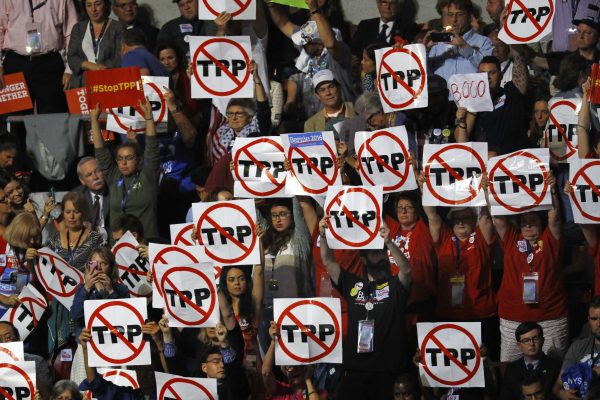Last month Mitch McConnell, the Republican majority leader of the Senate, confirmed his intention not to seek a vote on the TPP until the new president takes office in January.
Worse, both Hillary Clinton and Donald Trump have voiced their opposition to the agreement and support is souring on both sides of the aisle. Without the approval of a hesitant Congress the landmark agreement will fail to take effect.
In a sense, the TPP is facing a perfect storm of challenges in the United States. Some are lasting features of the US political landscape and of trade policymaking in general, while others are more transitory.
Economists have long recognised that open trade tends to benefit countries in the aggregate. But while these benefits are generally dispersed across the population, the harms of free trade are often concentrated, for example in job losses or in foreign competition. This is why the opponents of free trade tend to mobilise much more effectively than its supporters.
Protectionist mobilisation, of course, is a problem for free traders everywhere, but the nature of US institutions tends to make the problem especially acute.
The US Constitution gives near total authority to Congress over trade. And members of Congress tend to be more protectionist than the president because they each represent smaller constituencies, some of which will be hurt by free trade.
More than that, the use of primaries for selecting candidates weakens party leaders and puts nomination power in the hands of the rank-and-file, ensuring that individual members of Congress are strongly beholden to local interests. This encourages logrolling, with legislators agreeing to protect the preferred industries of their colleagues in return for similar considerations.
In an attempt to avert the strongly protectionist implications of these institutions, Congress used the 1974 Trade Act to create the system of executive delegation known as ‘fast track authority.’ When Congress chooses to grant fast-track authority, it binds itself to a yes-or-no vote on trade agreements signed by the president. This voluntary surrender of power allows Congress to secure outcomes that benefit the country as a whole while also deflecting blame to the president for the negative effects of trade. It avoids logrolling while enabling the president to demand concessions from trading partners for opening US markets.
As recently as last year, Congress granted President Obama fast track authority to complete the TPP. But a combination of factors has since changed the political environment in a dramatically anti-trade direction. Foremost among these is the ongoing presidential election.
The backlash against globalisation since the 2008 financial crisis has translated into a boost for trade sceptics on the ideological edges of both major parties. Democratic presidential nominee Hillary Clinton’s need to attract disaffected Bernie Sanders voters was without doubt central to her decision to turn against the TPP, which she had earlier supported as secretary of state. In many ways, of course, her repositioning on trade is presidential politics as usual; the establishment candidate often shifts away from the centre on certain key issues as a concession to the party base.
But what has been happening on the Republican side is anything but usual.
It is often argued that the US two-party system forces politicians to woo moderate voters. But what we are now observing is the takeover of a major party by its extreme element in the form of Donald Trump. In trade policy, Trump has been vehemently anti-globalisation. He has made attacking NAFTA and China central to his campaign, and he even put opposition to the TPP at the heart of his performance during the first presidential debate.
For Republicans, then, an anti-trade extremist wing has overwhelmed the once dominant party centre, which has long represented the free trade interests of business and finance. Among Democrats, the pro-trade centre typified by Clinton and Obama still remains strong, but even it is under greater pressure from the left than it has been for some time.
This situation has led Republican leaders in Congress, despite their history of backing trade agreements, to oppose bringing the TPP to a vote. Even if they are pro-TPP, party leaders fear a backlash from a protectionist party base mobilised by Trump. This dynamic proves that adverse political winds can kill, or at least stall, even those trade agreements that have been negotiated under fast track authority.
But we can be cautiously optimistic that the current populist revolt will not completely undermine the US trade agenda.
A majority of Americans still prefer freer trade. This support may not be heavily mobilised, but it has some strength left — President Obama’s emphasis on the TPP and Republican congressional support for granting fast track authority as recently as 2015 show this. And a Clinton presidency offers hope for the TPP. A free trader at heart, Clinton may try to save the agreement by tweaking some of its more controversial provisions, at least once the election ferment dies down.
In the end we can hope that America will combine continued leadership on trade liberalisation in the Pacific with domestic policy to aid those suffering from trade’s negative effects. Achieving that balance should be the goal of the next administration.
Charles R. Hankla is Associate Professor of Political Science at Georgia State University.

